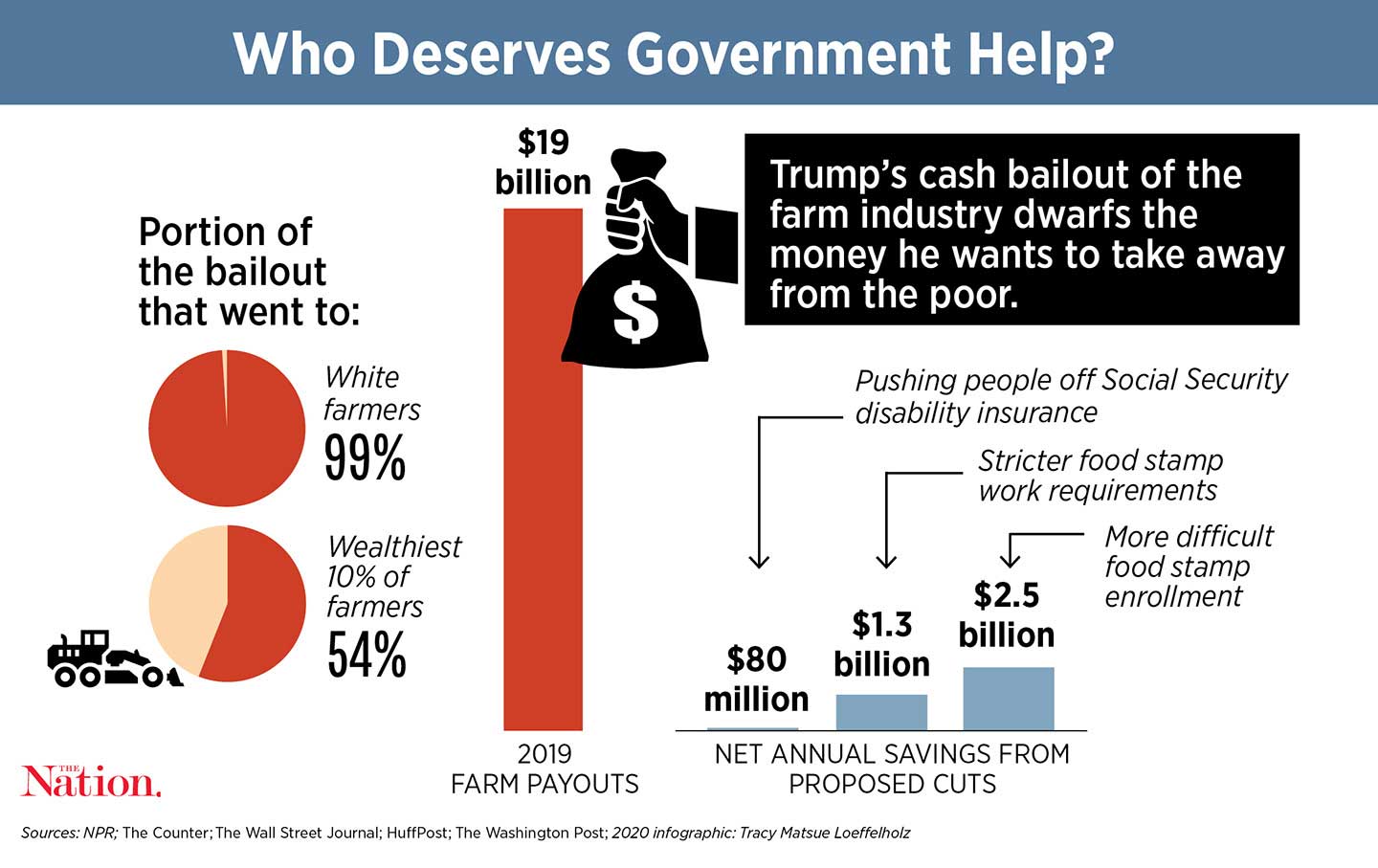
Donald Trump has never hidden his disdain for people who need government assistance. As far back as the 1970s, he grumbled that the Department of Justice was forcing him and his father to rent to “welfare cases” after it sued the Trumps for racial discrimination. Decades later, he called Barack Obama “our Welfare & Food Stamp President.”
But one of his administration’s signature policies has laid bare the racial and class implications of this disdain. It’s not that Trump hates all welfare. He just hates it when it appears to be going to poor black people.
One of the few campaign promises that Trump has fulfilled is on trade. In an attempt to boost American industries, he has levied billions in tariffs on foreign-made products, particularly on goods from China. American farmers have felt much of the pain, especially those who grow soybeans, whose sales began to dry up after China responded with its own tariffs. To soften the blow, the Trump administration started making direct payments to farmers.
The sum is huge. Trump’s farm aid is larger than the auto bailout during the Great Recession. The total package comes to $28 billion; $19 billion was paid out last year, with more to come in 2020.
That amount dwarfs the kinds of public programs that Trump rails against. We spend just $17 billion each year on traditional cash welfare, known as Temporary Assistance for Needy Families. Still, in his most recent budget proposal, the president called for slashing TANF by $21 billion over the next decade.
Trump’s farm aid is also far more than what he’s trying to claw back from the poor. His administration will soon tighten the work requirements for people who rely on food stamps by curbing states’ ability to issue waivers for people without dependent children. “We need to encourage people by giving them a helping hand but not allowing it to become an indefinitely giving hand,” said Secretary of Agriculture Sonny Perdue. The change will save just $12.8 billion over the course of a decade, according to the White House’s own projections. The administration is also looking to end a more streamlined process for the destitute to enroll in the food stamp program; this would save a mere $2.5 billion a year.
Even less money would be recouped by Trump’s crackdown on Social Security disability payments. The administration has proposed intensifying the periodic reviews disabled people must undergo to continue receiving benefits and requiring that they occur more frequently, all with the aim of pushing people off the rolls. While doing so would create an enormous burden for recipients, it would save just $2.6 billion over a decade. The effort would cost an extra $1.8 billion to administer, resulting in savings of only $80 million annually.
For Trump, the people who need cash payments, food stamps, or disability checks are the wrong kind of welfare recipients. And while whites are the largest group receiving public assistance, most Americans believe that those who receive “welfare” are poor black people. The right kind of recipients, it seems, are white wealthy farmers. While agriculture is a diverse industry, as of last summer more than 99 percent of Trump’s agriculture bailout funds had gone to white operators, according to information obtained by The Counter, a nonprofit newsroom that investigates the food industry. A majority of aid has gone to the wealthiest 10 percent of farmers.
These farmers are now largely dependent on the money. Nearly 40 percent of projected farm profits last year came from trade aid and other government subsidies. And despite the Republicans’ constant fearmongering about welfare fraud, the farm money has flowed with seemingly little oversight or accountability. Thanks to overestimates of the damage from Trump’s trade war, farmers have been getting aid payments from the government greater than the losses they suffered, according to six studies. But that hasn’t stopped Trump from bragging about his farm bailout. At his first rally of 2020, in Toledo, Ohio, he called the farm subsidies package “a big, beautiful monster.”
When Trump and his officials chastise the poor for allegedly failing to work hard and living large off government largesse, their indignation shouldn’t be taken at face value; it’s reserved specifically for poor black Americans. Meanwhile, wealthy white farmers are encouraged to collect government checks.
Bryce CovertTwitterBryce Covert is a contributing writer at The Nation and was a 2023 Reporter in Residence at Omidyar Network.